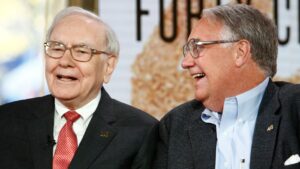The Future of Dividends at Berkshire Hathaway: What Investors Should Know
At Extreme Investor Network, we understand that investment decisions hinge on reliable insights, especially regarding one of the most iconic companies in the world: Berkshire Hathaway. For decades, Warren Buffett’s steadfast refusal to issue dividends has raised questions and stirred debates among investors. As he approaches the twilight of his career, many wonder if this policy will persist. Join us as we delve into this intriguing topic and explore what it means for current and future investors.
Buffett’s Relentless Dividend Stance
Warren Buffett has been vocal about his aversion to dividends. Since Berkshire Hathaway last paid a dividend in 1967—a decision he later deemed a "terrible mistake"—he has prioritized reinvestment over cash payouts. Buffett believes that deploying capital into profitable ventures yields significantly greater returns than traditional dividends. His philosophy is simple yet powerful: if you invest wisely, the compounded growth can generate returns far superior to those offered by regular dividend payments.
In a 2018 interview with CNBC, Buffett highlighted why he favors stock buybacks over dividends. Not only do buybacks provide flexibility to the company, but they also enhance shareholder value by reducing the total number of outstanding shares. This method aligns with Buffett’s long-term vision, allowing investors to benefit from the company’s appreciation over time rather than relying on scheduled payments that could be trimmed or eliminated.
A Glimpse into Berkshire’s Future
The question of dividends has resurfaced, especially with Howard Buffett—Warren’s son—set to take over as non-executive chairman in the future. When asked about Berkshire’s dividend policy in a recent Wall Street Journal interview, Howard chuckled before admitting it was a "trick question." His uncertainty leaves the door open for speculation about the company’s approach after Warren Buffett’s departure.
As of now, Berkshire’s cash reserves have ballooned to an impressive $325 billion, constituting nearly 30% of the company’s total assets—a level not seen since 1990. This financial muscle gives Berkshire significant leverage, and with rising inflation and interest rates, Buffett has been parking a portion of this capital into Treasury bills and notes, squeezing out decent returns.
The Changing Landscape of Investment Decisions
Warren Buffett has frequently emphasized that his investment strategy must adapt to changing market conditions. In recent years, he has expressed concerns about inflated asset prices, limiting the number of perceivable investment opportunities. The last significant acquisition was the purchase of Alleghany for $11.6 billion in 2022, indicating a more cautious approach to deploying Berkshire’s capital.
Buffett’s views on succession planning have also evolved. Historically, he relied on a collective decision-making model among Berkshire’s executives. In contrast, he now recognizes that the vast size of the company requires a more streamlined approach. Greg Abel, his designated successor, will have greater autonomy over investment decisions, reflecting an understanding that strategic agility is vital as markets dynamically shift.
Understanding the Implications for Investors
What does all this mean for investors? While Buffett’s steadfast principles have served Berkshire Hathaway well, we might be on the brink of a transformation in its financial strategies. As we move deeper into the 21st century, the investment landscape is laden with unpredictable challenges and opportunities.
-
Evaluate Your Investment Philosophy: If dividends have been your primary motive for investing, it may be time to reassess your strategy. Berkshire’s approach emphasizes long-term growth, and understanding this can help align your portfolio accordingly.
-
Stay Informed: Keep a close eye on emerging trends within Berkshire Hathaway. As Howard Buffett steps into a leadership role, his influence could usher in new ideas about capital allocation and dividend policies.
- Embrace Market Dynamics: Opportunities often come from unexpected places. While Buffett has expressed caution regarding valuations, remember that market corrections and evolutions can provide fertile ground for investing.
In conclusion, while the future of dividends at Berkshire Hathaway remains ambiguous, one thing is certain: adaptability and informed decision-making will be crucial for investors looking to navigate this new era. At Extreme Investor Network, we’re committed to bringing you the insights you need to make sound investment choices. Stay tuned for more expert analysis as the financial landscape continues to evolve!

